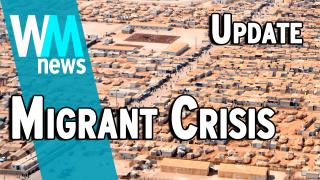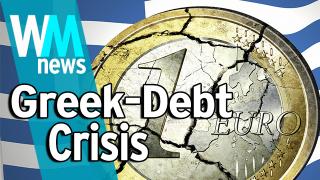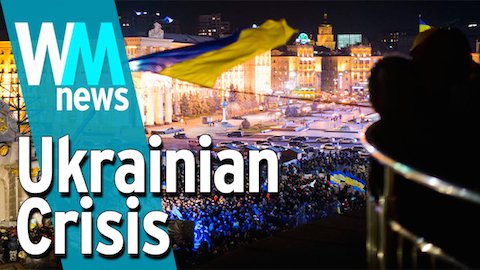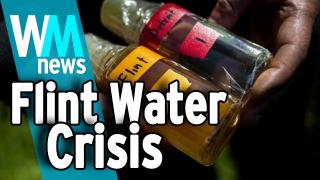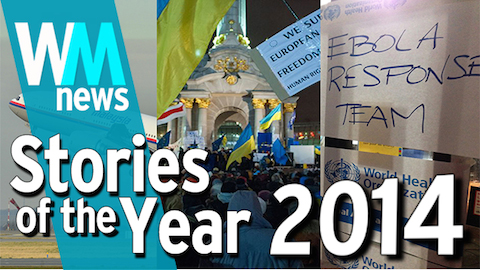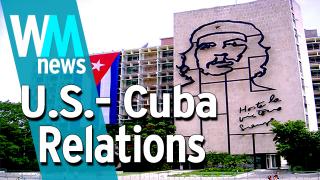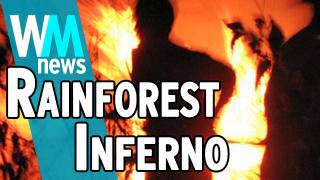10 Colombia-Venezuela Border Crisis Facts - WMNews Ep. 43
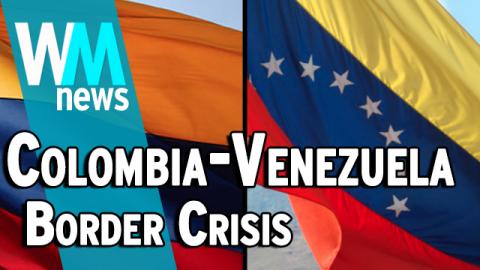
Tensions are once again running high along the Táchira River in 2015, as South American politics are pushed to breaking point. Welcome to WatchMojo News, the weekly series from http://www.WatchMojo.com where we break down news stories that might be on your radar. In this installment, we're counting down 10 crucial facts you should know about the Venezuela Colombia Border Crisis.
#10: What Is the Border Crisis? The State of Emergency
5 EU Migrant Crisis Update Facts - WMNews Ep. 44
On Friday, August 21st, 2015, Venezuelan president Nicolas Maduro sent the country into a 60-day ‘state of emergency’, in an apparent attempt to address the South American nation’s growing social and economic problems. As Maduro searches for what many critics are calling a ‘scapegoat’, his attentions have landed upon neighboring nation, Colombia, and specifically the Colombian population living in Venezuela. Venezuelan troops have been deployed to round up and deport Colombian nationals from the country, which, in turn, has triggered many potential targets to scramble across the border voluntarily, before they are forced to do so.
#9: Which Countries Are Involved in the Border Crisis? The Border
Events are unraveling along the Táchira River, which forms part of the border between Venezuela and Colombia. The water is a little over knee-high at some points, and traversable, while the village of San Antonio has become a major crossing point for Colombians seeking refuge in their homeland. Maduro has insisted that driving out immigrants is a national necessity for Venezuela, as it is an attempt to stabilize the economy, crack down on illegal smuggling, and stop instances of violence instigated by what the Venezuelan government calls ‘Colombia’s paramilitary forces’. However, the Colombian president, Juan Manuel Santos, has criticized his counterpart, claiming that Maduro has attacked ‘poor and humble families who want to live and work’.
#8: Who Does The Border Crisis Affect? The Colombians
Top 10 Greek Debt Crisis Facts - WMNews Ep. 13
Maduro’s ‘state of emergency’ has quickly upended the lives of around 6,000 Colombians, with 1,000 officially deported and hundreds more leaving through fear. In a distressingly dictatorial move, the Venezuelan state has had some Colombian homes emblazoned with a ‘D’ for ‘demolition’, as authorities have been granted rights to search homes without a warrant. In all, there are 5 million Colombians living in Venezuela, making up around 15% of the country’s population - all of whom are potential targets within the current climate.
#7: How Has the Border Crisis Escalated? The Recall
10 Ukrainian Crisis Facts - WMNews Ep. 6
The situation further developed as both nations recalled their relevant ambassadors, and relations between the two worsened by the end of August 2015. Colombia and president Santos were the first to act, withdrawing their envoy amid a situation that they described as ‘unacceptable’. Santos was quoted as saying that he could not allow Venezuela to treat Colombians and the Colombian government in this way. Shortly after the Colombian withdrawal, Venezuela followed suit and recalled its representative, ‘for consultations’. A political standoff ensued, with Colombia in particular promising to call for an extraordinary meeting of foreign ministers from the Union of South American Nations. Tensions between the two countries seemed likely to become a pressing matter for the entire South American continent, and indeed, within general international affairs.
#6: Who Is the Leader of Venezuela? The Socialist President
Top 5 Flint Water Crisis Facts - WMNews
Nicolas Maduro was elected president of Venezuela in April 2013, and had previously served as the country’s Vice President. From 2006 to 2013, he also served under former leader Hugo Chavez, as Minister of Foreign Affairs. A member of the United Socialist Party, Maduro is a former bus driver who began his political career as a trade unionist, rising though the ranks to eventually become one of the most well respected politicians within Chavez’s ‘inner circle’. He gained his presidential position with a 1.5% margin, and has since presided over an especially difficult and controversial time in the nation’s history.
#5: What Is the Current State of the Venezuelan Economy? The Inflation
Venezuela’s economy is by no means a healthy one, as inflation threatens to spiral out of control. For many, the president’s latest move against Venezuela’s Colombian population is at least partly wrapped up in his attempts to find a reason, or at least a blame, for his country’s growing problems. Essentially, there’s too much literal money being printed, and not enough goods on which to spend it - meaning that prices have hugely accelerated. Official figures out of Venezuela, published in February of 2015, suggest that the situation may be manageable, but other estimates disagree - with some calculating that the nation’s cost-of-living has increased over 700%. A nightmare situation for the Venezuelan people, it’s suggested that the Colombian immigrants are being forcibly deported as part of an ‘economic war’, in an attempt to forcibly balance the books.
#4: What Were the 2014-15 Venezuelan Protests? The Demonstrations
Top 10 Stories of 2014: Year in Review - WMNews Ep. 7
In response to Venezuela’s dangerously unbalanced economy, and also in relation to the country’s rising rate of violent crime, 2014, and especially its early months, was dominated by public protest. Demonstrations began in January, after the murder of former Miss Venezuela, Monica Spear, and intensified in February, following the attempted rape of a university student in San Cristobal, Tachira. The police’s subsequent arrest and brutalization of five student protestors spawned even more civilian antagonism and further rows between government forces and their opponents. By the end of the year, and into 2015, low oil prices and economic struggles in general were at the heart of the matter. Though the majority of protests were peaceful, criticism fell on both sides of the divide as the rallies regularly played host to violent crimes themselves, and severe vandalism. Maduro’s government, and pro-government paramilitary groups, were also accused of torturing captured protestors, and of using live ammunition to ward crowds away, instead of rubber pellets or tear gas.
#3: How Are Venezuelan-Colombian Relations? The History
Top 10 U.S. - Cuba Relations Facts - WMNews Ep. 12
During the early 1800s, the two nations were actually one, as their territories fell within enterprising revolutionist Simon Bolivar’s, ‘Gran Colombia’. Since then, the border between the two countries, as well as each nation’s respective waters, have almost always been under scrutiny. In relatively recent times, the Caldas Frigate incident highlighted territorial problems, as there was a standoff in 1987 between the Colombian military, who were considered ‘trespassers,’ and the Venezuelan Air Force. In the twenty-first century, the relationship between the two countries has remained strained, particularly during the coinciding presidencies of Venezuela’s Hugo Chavez and Colombia’s Alvaro Uribe. Between 2002 and 2010, in particular, allegations were made from either side, triggered by a wide range of subjects - from the keeping of prisoners, to the development of weapons, to the conspiring of one government against the other.
#2: What Has Been the Status of Colombian Immigrants? The Past
Surveys show that the majority of Venezuelans believe the deportation of Colombians is merely a ‘smoke screen’ for the country’s deeper problems. In general, for the everyday person, the status of Colombian immigrants has not shifted too severely. In recent history, Venezuela has carved a reputation for being especially welcoming and receptive to foreigners. In fact, in 2004 former President Hugo Chavez provided Colombians in Venezuela the right to vote and residency. Unfortunately, following events in 2015, things seemed likely to change.
#1: How Will This End? The Future
10 Indonesia on Fire Facts - WMNews Ep. 52
As of early September 2015, the situation seemed to be reaching a climactic point. Maduro’s decision to deport was a statement of intent, and a clear act of provocation. While ridding Venezuela of its Colombian population is unlikely to end an economic crisis, it could buy the president some time, which is important given that the nation was approaching its parliamentary election, in December 2015. However, the damage done to its relationship with Colombia might prove more costly and counter-productive in the long-term. After decades of highs and lows, the Venezuela/Colombia relationship looks to be in a critical condition. With the Colombian president already calling for crisis talks with South American leaders, the eyes of the world are turned to the two countries, as a resolution is sought. Did these facts get you thinking? To vote for which news story is covered next head over to WatchMojo.com/suggest, and be sure to hit that subscribe button for more newsworthy top tens published every week!


